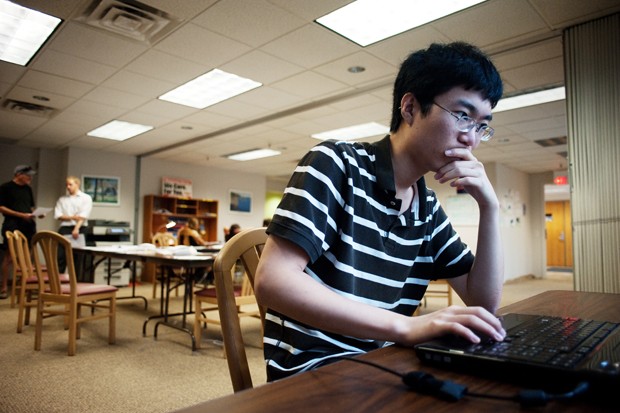For students looking to make a career out of campaigning, or those just plain interested in politics, working for a political candidate can be a very valuable experience.
Although a much greater number of students outside the political science department probably work for campaigns, University of Minnesota political science professor Paul Soper said about one-third of the students in the internship class he teaches opt to work for a political candidate.
“We’ve always had students who are interested in working on political campaigns,” he said.
Campaigns are valuable to students looking for a career in politics because they provide an opportunity to make connections with experienced professionals, Soper said, which is often the reason they join.
Otherwise, students are often simply interested in supporting a candidate.
University students or alumni work or intern for at least the three major Democratic campaigns.
A spokesman for Tom Emmer was unsure if any University of Minnesota students worked for the campaign, but was able to confirm no Twin Cities students were working as interns. The Republican Party of Minnesota declined to take part in this story.
Matt Swenson, Margaret Anderson Kelliher
Driving back from Mississippi in 2006 after Hurricane Katrina devastated the Gulf Coast, Matt Swenson decided to postpone studying at the seminary for a different sort of service.
“If I went to the seminary I would always be saying, ‘What if I’d actually stood up and done something about this? Could I have made a difference?’ “
That summer, he started work at the Minnesota Legislature.
There, Swenson, a spring 2010 graduate of the Humphrey Institute of Public Affairs, worked with others setting up the Interstate 35W bridge compensation fund and helped craft a disaster relief message after southern Minnesota flooded in 2007.
“I wanted to be the best public servant I could be for my community and my state,” he said.
Swenson began studying at the Humphrey Institute in 2007, combining a master’s degree in public policy with communications from the School of Journalism and Mass Communication.
Nearing the end of the 2010 Legislative session — close to graduation — Swenson said Speaker of the House Margaret Anderson Kelliher offered him a job as press secretary of her gubernatorial campaign.
He said Kelliher’s message and work ethic captivated him.
Now, Swenson begins his day reading the news over a bowl of Froot Loops, he said. When he gets into the office, he works with Kelliher’s communication team on the tasks for the day. Otherwise, much of his time is spent calling reporters and writing anything ranging from speeches to news releases or editorials.
“It’s basically constant work from the time I wake up in the morning until at least midnight,” he said.
Thomas Trehus, Matt Entenza
It’s the little things that motivate Thomas Trehus after a long day of door knocking or manning a phone bank for Matt Entenza’s gubernatorial campaign.
When Trehus, a University political science sophomore, canvassed in Red Wing last week for the campaign, he was impressed with how receptive and friendly the people were — friendly enough to offer him a Coca-Cola, he said.
“It was one of the best experiences door knocking I’ve had,” Trehus said.
Likewise, if he’s had a long day at the office making phone calls, seeing Entenza or his running mate Robyne Robinson is enough to keep him going, Trehus said.
Trehus began as a regional field organizer for the campaign July 1. He often works 12-hour days making early phone calls to seniors, coordinating to ensure interns and volunteers are available at night, working special events and canvassing on the weekends. It’s all about spreading Entenza’s message, Trehus said.
Although the hours are long and “you don’t have much of a life outside of politics,” Trehus said, for him, the 2010 election is too important to miss.
As a student, Trehus is especially concerned with the cost of higher education in the state and said Entenza’s vision resonates with him.
Despite being new to the campaign, Trehus has experience in politics, he said.
He began at 17 as an alternate delegate to the 2008 DFL Party convention and returned as a full delegate in 2010, this time bringing his parents with him. He’s also worked for some campaigns near his hometown of Spring Grove, Minn.
When asked why he does it all, Trehus said, “Right now it’s the love of politics. As much as I want to take some time off, I love doing it.”
Louis Wang, Mark Dayton
Louis Wang, a University mathematics sophomore, turned from a “casual political observer” into a political player about a year ago when he began interning for Mark Dayton.
Wang, who helps research Dayton’s economic plans with a team of other interns and staff, does very visible work with little fanfare.
“He’s obviously a very smart kid,” deputy campaign manager Katharine Tinucci said. “His research skills have been very helpful.”
Although it’s not a complete departure from his math background — he’s the only mathematics major on the campaign, he said — politics is a whole new game for Wang.
“I came here to experience a different type of passion from what I was familiar with, which is the sciences,” he said. “This one is a slightly different experience and I enjoy every second of it.”
Wang said a friend initially told him about the campaign. He was initially attracted to Dayton’s sincerity and ultimately believes the would-be governor can solve the state’s current fiscal crisis.
Right now, Wang said he’s working on researching the state budget and has searched for health care statistics in the past.
But the realities of a campaign require other, less specialized work emblematic of a political race.
So if Wang isn’t researching for “hours and hours,” as Tinucci described, he makes phone calls, walks in parades and folds letters.
“This is a little too fast-paced for my lifestyle, I’ll give you that much,” Wang said. “But I’m keeping up with everything I’ve got right now.”








